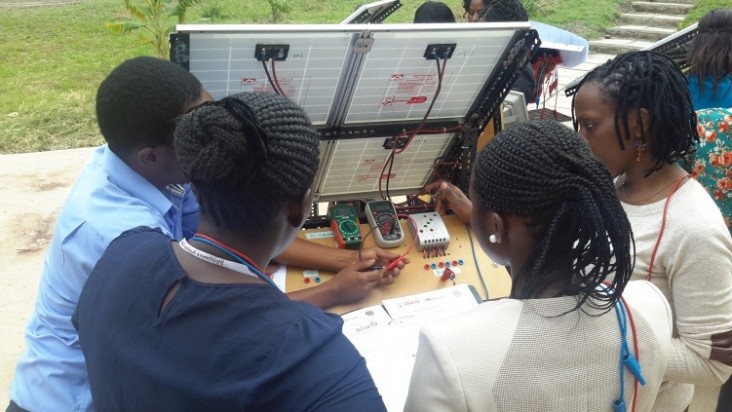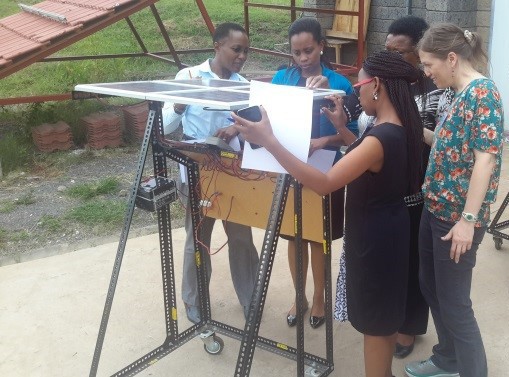- Where We Work
- Africa
- African Union
- Power Africa
- Trade and Investment
- Angola
- Benin
- Botswana
- Burkina Faso
- Burundi
- Cameroon
- Central Africa Regional
- Central African Republic
- Chad
- Côte d'Ivoire
- Democratic Republic of the Congo
- Djibouti
- East Africa Regional
- Eswatini
- Ethiopia
- Ghana
- Guinea
- Kenya
- Lesotho
- Liberia
- Madagascar
- Malawi
- Mali
- Mauritania
- Mozambique
- Namibia
- Niger
- Nigeria
- Republic of the Congo
- Rwanda
- Sahel Regional
- Senegal
- Sierra Leone
- Somalia
- South Africa
- South Sudan
- Southern Africa Regional
- Sudan
- Tanzania
- The Gambia
- Uganda
- West Africa Regional
- Zambia
- Zimbabwe
- Asia
- Europe and Eurasia
- Latin America and the Caribbean
- Middle East
- Mission Directory
Speeches Shim
In Kenya, East Africa’s largest economy, 62% of women participate in the labor force, many in the informal sector.[1] There is great opportunity to increase women’s workforce participation and few sectors seem as promising as the energy sector. The Kenyan Ministry of Energy and Petroleum seeks to add 5000 megawatts to the national grid in coming years in order to achieve the government’s goal of creating a “globally competitive and prosperous nation with a high quality of life” by 2030.[2] A significant amount of this new power is expected to come from renewable sources.
Ensuring that women participate in Kenya’s growing clean energy economy and in the energy sector across all of sub-Saharan Africa is a central goal of the U.S. Agency for International Development’s (USAID) Power Africa initiative. Power Africa is achieving this goal with the help of USAID’s Vocational Training and Education for Clean Energy (VOCTEC) program. Implemented by USAID partner Arizona State University (ASU), VOCTEC seeks to enhance local knowledge and capacity to design, install, operate and maintain small-scale clean energy systems in developing countries.
“The opportunity overall was unique, highly educative and transformational. I am so equipped for the solar industry now!” says Mary Mindo of the Jomo Kenyatta University of Agriculture and Technology about the recent VOCTEC solar photovoltaic (PV) training she took in Nairobi, Kenya.

One way the VOCTEC program seeks to strengthen local technical capacity is by training local people to become trainers themselves. After an initial educator training in Kenya in 2014 had nearly all male participants, ASU and Kenyan partner Strathmore University set out to attract more women by holding an innovative all-female train-the-trainer solar training in April 2015. Led by female trainers, the training attracted nearly three times as many applicants as the partners could be accommodate. This training effort, supported with funding from Power Africa, forwards Power Africa’s objectives of empowering women and creating opportunities for women throughout the energy value chain.
“I found having a female instructor very motivating as it showed me even women can be professional installers and be the best in their field. Having fellow female participants created a less intimidating environment to share and get feedback," said Caroline Nwangi-Makenzi, Solar Engineer and Product Manager at David and Shirtliff, Ltd.
“Having all women’s trainings is important because they create a supportive learning environment for women in what is typically all-male industry,” explains VOCTEC Instructor Carol Weis. “Many of the women had theoretical experience with solar, without much prior hands-on installation, and showed a natural aptitude for this work. There was pride in workmanship while installing, commissioning, testing, and troubleshooting the systems together, and joyful celebration once the lights came on each system,” Weis said.

The course had students share their experiences of working in the field, providing real world accounts of working with end users in Kenyan mini-grids, building women’s cooperatives, and installing solar water pumping. Strathmore Energy Research Center staff member Teddy Nalubega, one of the instructors, noted that of the 212 solar technicians licensed to work within Kenya, only 5 are female. “I believe a majority of our training participants now feel confident enough to go ahead and apply for licensing immediately,” Ms. Nalubega said.
“I was impressed and humbled when I learned how talented and motivated these women were to further their careers in the solar industry,” said Ms. Weis. Daphin Juma is one such example. A power transmission engineer by training, Juma decided to expand her electrical installation business to incorporate solar PV Installation after attending the Women’s PV training. She has already successfully diagnosed a faulty solar PV system, which subsequently led to a business opportunity for her.
The Women’s PV trainees were so inspired by the course that they have formed a local group designed to empower and encourage women to work in the renewable energy sector. According to Tameezan wa Gathui, one of the founders, “We know that there are already women out there doing a great job and it is important to recognize the work of all these “champions”, to give them a voice so that they too can be heard, so that they can be the role models for future generations. I see this group as being one of the ways through which we can channel this empowerment through more trainings and capacity building of women in the Eastern Africa region.”
About the VOCTEC Program and Arizona State University
The Vocational Training and Education for Clean Energy (VOCTEC) program is a global program funded by the United States Agency for International Development (USAID) and implemented by Arizona State University (ASU). VOCTEC aims to improve the sustainability of renewable energy infrastructure and investments in developing countries by increasing awareness, knowledge and capacity of local stakeholders, primarily in decentralized clean energy technologies.
VOCTEC is a multitier vocational training program that includes training for Technicians (level 1 (L-1)), training for Trainers (level 2 (L-2)), and educational workshops for Policy and Decision Makers (level 3 (L-3)). VOCTEC training integrates gender-awareness into the curriculum to promote access by, and participation of, women in vocational education for renewable energy technologies. VOCTEC’s technical focus is on sustainable, renewable energy systems including solar PV, micro-hydro, wind, and hybrid systems that utilize any combination of these technologies.
Arizona State University (ASU) has developed a new model for the American Research University creating an institution that is committed to excellence, access and impact. ASU measures itself by those it includes, not by those it excludes. ASU pursues research that contributes to the public good, and ASU assumes major responsibility for the economic, social and cultural vitality of the communities that surround it. ASU today enrolls more than 75,000 students on four campuses in metropolitan Phoenix, maintaining a tradition of academic excellence in core disciplines while gaining recognition as an important global center for innovative interdisciplinary research. ASU has extensive programs in renewable energy arena including solar, bio-fuels and fuel cell systems.
About Strathmore University, Nairobi, Kenya
Strathmore University, a leading University in Kenya, has a mission to provide all-round quality education in an atmosphere of freedom and responsibility; excellence in teaching, research and scholarship; ethical and social development; and service to society. Strathmore seeks to become a leading entrepreneurial research university by translating its excellence into a major contribution to culture, economic well-being, and quality of life. Today, Strathmore University has 4,393 students (full-time and part-time) studying accountancy, administration, commerce, finance, management and information technology.
For further information please contact Ms. Pam Baldinger (USAID VOCTEC Program officer) at pbaldinger@usaid.gov or Dr. Anshuman Razdan (Administrative Director of VOCTEC project) at razdan@asu.edu. More information about VOCTEC can be found at http://voctec.asu.edu.
[1] World Bank statistics: http://data.worldbank.org/indicator/SL.SRV.EMPL.FE.ZS/countries
[2] Ministry of Energy and Petroleum: http://www.energy.go.ke/index.html

Comment
Make a general inquiry or suggest an improvement.